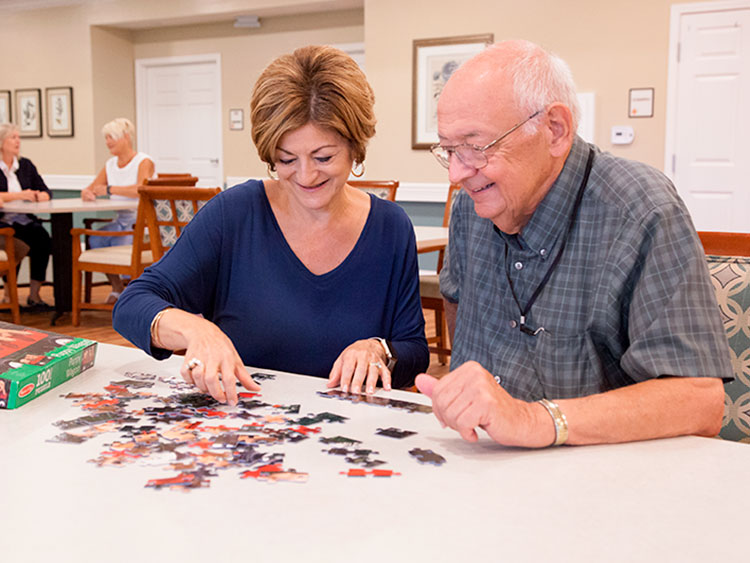Dementia is more than memory loss. It’s a gradual, often unpredictable shift in how a person thinks, communicates, and experiences the world. Families navigating this journey may feel like they’re constantly adapting—because they are. No two experiences are identical, but there are common patterns that can help guide your expectations and caregiving approach.
If you’re caring for someone with dementia, it’s natural to feel overwhelmed by the unknowns. Instead of focusing on clinical stages, let’s explore how dementia changes daily life, relationships, and decision-making over time.
A Shift in the Everyday
The first signs of dementia are often brushed off—misplaced keys, a forgotten appointment, or an unusual struggle with simple decisions. But over time, small inconsistencies become bigger challenges.
Imagine your loved one—perhaps your mother—who always balanced the checkbook down to the penny. One day, you notice unpaid bills stacked on the kitchen counter. She insists she’s handling everything just fine, but the numbers no longer make sense to her.
Or maybe it’s your father, who suddenly seems withdrawn at family gatherings. He used to tell the best stories, but now he struggles to follow conversations. It’s not just forgetfulness; it’s confusion, frustration, and sometimes, even embarrassment.
At this stage, what helps most isn’t just reminders—it’s reassurance. Letting your loved one know they’re still capable, even if they need a little extra support.
When Familiar Things Become Foreign
Over time, the world around them begins to feel less predictable.
- A kitchen they’ve cooked in for years may suddenly feel unfamiliar.
- They may forget names, not just of distant relatives, but of close family members.
- Their reflection in the mirror may confuse them—”Who is that?”
For caregivers, this stage can be emotional. Your loved one might ask for someone who has passed away. They may accuse you of hiding things. They might insist on “going home” even when they’re sitting in their own living room.
Instead of correcting them, try stepping into their reality. If Mom is looking for her mother, rather than saying, “Grandma passed away 30 years ago,” try, “Tell me about your mother. What did she love to do?” Shifting the conversation can ease their anxiety and bring comfort to both of you.
The Changing Role of a Caregiver
As dementia progresses, caregiving becomes less about reminding and more about adapting.
- Mealtimes may take longer because using utensils is confusing.
- Dressing might require step-by-step assistance.
- Wandering and restlessness can become daily concerns.
The biggest lesson? What worked yesterday might not work today. Flexibility is key.
Some caregivers describe this stage as “the long and winding road.” Your loved one may still have moments of clarity, where they recognize you and smile. But there may also be difficult days, when they don’t know who you are or mistake you for someone else.
During this time, you need support, too. Whether it’s family, respite care, or a professional memory care community, finding help is essential—not just for them, but for you.
When Comfort Becomes the Priority
Eventually, dementia affects physical health as much as cognitive ability. Walking becomes difficult, eating requires assistance, and speech may be reduced to just a few words—or none at all.
This stage is about comfort and connection in new ways:
- Holding their hand, even if words fail.
- Playing their favorite music to spark recognition.
- Offering their favorite scents or familiar soft textures.
For many families, professional memory care or hospice support becomes necessary. The goal shifts from keeping them engaged to keeping them comfortable.
Preparing for the Journey Ahead
Dementia isn’t just a medical condition—it’s a journey that reshapes lives, both for the person diagnosed and for their loved ones. Understanding what to expect doesn’t mean predicting every detail; it means being ready to adjust, support, and find moments of joy along the way.
At Ganzhorn Suites, we understand that dementia care is not one-size-fits-all. That’s why we offer a household model designed specifically to meet the needs of residents at different stages of dementia. Each household is purposefully structured to provide an environment that matches the cognitive and physical abilities of its residents, ensuring they receive the appropriate care, engagement, and support at every phase of their journey.
Our approach fosters a sense of familiarity and comfort, reducing anxiety and promoting independence where possible. By tailoring care within these small, intimate settings, we create an atmosphere that enhances safety, dignity, and quality of life. Whether your loved one is in the early stages of dementia and still engaging in familiar routines or requires full-time support with daily activities, our Certified Dementia Practitioners are trained to provide personalized, compassionate care.
To help you navigate the practical side of dementia care, we’ve put together a free guide outlining the specific stages of dementia and what to expect at each phase. Download your copy here.
You don’t have to figure this out alone. By educating yourself and planning ahead, you can provide the best possible care while also taking care of yourself along the way.
For more information about the Ganzhorn Suites household model and how it supports different stages of dementia, contact us today at 614-356-9810 (Powell) or 440-294-1500 (Avon).

